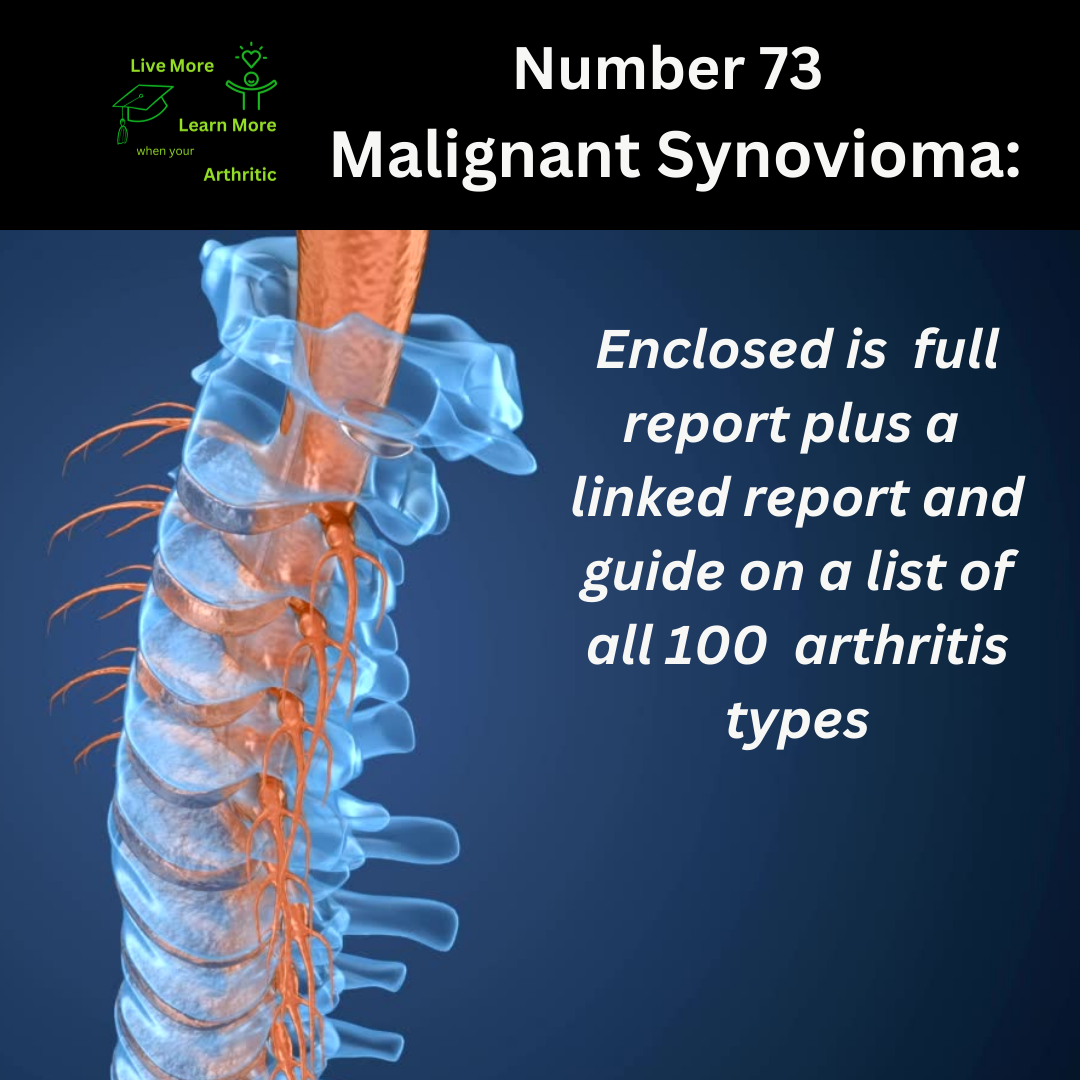
Malignant Synovioma: Number 73 on the list of 100 types of Arthritis
Malignant synovioma, also known as synovial sarcoma, is a rare and aggressive type of cancer that typically arises near the joints in the soft tissues of the arms or legs. Despite its name, it actually arises from soft tissue cells, not from synovial cells themselves. Synovial sarcoma accounts for about 5-10% of all soft tissue sarcomas. It is an uncommon cancer, affecting approximately one to three people per million each year.
 Description of Malignant Synovioma
Description of Malignant Synovioma
Malignant synovioma is characterized by the abnormal growth of cells within the soft tissues, particularly those near joints such as the knees or elbows. Despite its name, this cancer actually develops from cells in the soft tissues, not from the synovial cells that form the synovium (the lining of joint cavities).
Causes and Triggers
The exact causes of synovial sarcoma are not entirely understood, but it is believed to be linked to specific genetic abnormalities. Chromosomal translocations involving chromosomes X and 18 are commonly associated with this cancer. However, most cases of synovial sarcoma occur sporadically without any known inherited genetic mutations.
Symptoms and Limited Range of Motion
The symptoms of synovial sarcoma can vary depending on the location and size of the tumor. Common signs include a palpable mass or swelling near a joint, pain, tenderness, and limited range of motion. In advanced stages, individuals may experience fatigue, weight loss, and other systemic symptoms.
Onset and Demographics
Synovial sarcoma can occur at any age but typically affects young adults between the ages of 15 and 40. It affects males and females equally, with no significant gender predilection.
Lifespan Impact and Prognosis
The prognosis for synovial sarcoma depends on various factors, including the size and location of the tumor, its grade (how abnormal the cancer cells appear under a microscope), and whether it has spread to other parts of the body. The five-year survival rate for localized synovial sarcoma is around 70%, but this drops significantly if the cancer has spread.
Autoimmune Component and Arthritis
Synovial sarcoma is not considered an autoimmune disease or a form of arthritis. It is a distinct type of cancer that originates from soft tissue cells rather than immune-related cells or joint tissues.
Quality of Life and Proactive Approaches
While the treatment of synovial sarcoma primarily involves surgery, radiation, and sometimes chemotherapy, proactive approaches can improve the quality of life for individuals living with this condition. Physical therapy and rehabilitation programs can help restore range of motion and functional abilities following treatment.
 Complications and Associated Conditions
Complications and Associated Conditions
Possible complications of synovial sarcoma include local recurrence of the tumor, metastasis (spread) to other parts of the body, and functional impairments related to the tumor’s location. It is essential for individuals with synovial sarcoma to undergo regular follow-up evaluations to monitor for any signs of recurrence or metastasis.
Natural Breakthroughs and Health Advantages
There are no specific natural breakthroughs or health advantages associated with synovial sarcoma. However, maintaining a healthy lifestyle with a balanced diet, regular exercise, and stress management can support overall well-being during cancer treatment and recovery.
Interconnected Diseases or Conditions
Synovial sarcoma is not typically associated with other specific diseases or conditions, although certain genetic syndromes or environmental factors may increase the risk of developing soft tissue sarcomas in general.
In summary, malignant synovioma (synovial sarcoma) is a rare and aggressive soft tissue cancer that primarily affects young adults. While its exact causes remain unclear, advances in medical treatment and proactive rehabilitation can help improve outcomes and quality of life for individuals diagnosed with this challenging condition. Early detection and a multidisciplinary treatment approach involving surgery, radiation, and chemotherapy when necessary are crucial in managing synovial sarcoma and achieving the best possible outcomes for patients.
